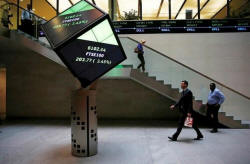|
No choppers yet: yen
jumps before Bank of Japan meeting
 Send a link to a friend
Send a link to a friend
 [July 26, 2016]
By Patrick Graham [July 26, 2016]
By Patrick Graham
LONDON (Reuters) - A buoyant yen and a fall
in oil prices to their lowest since early May put stock markets on the
defensive on Tuesday, as investors position for central bank meetings in
the United States and Japan.
The rise in the yen, traditionally a safe haven for capital when
investors are concerned by political and economic risks, may be largely
due to a recalibrating of expectations for the scale of new economic
stimulus from the Bank of Japan on Friday.
Japanese officials have quelled speculation of it dropping outright
"helicopter money" into the economy, but even expectations for the scale
of extra buying of financial assets with newly minted yen have cooled
this week.
A Nikkei report said Japan's government was likely to double the amount
of direct fiscal outlays into the economy over the next few years to 6
trillion yen ($57 billion). But that figure was viewed as too modest to
engender a return of inflation that would weaken the yen.
"There had been too many test balloons concerning Japan’s upcoming
monetary and fiscal easing programs over recent weeks," analysts from
Morgan Stanley said in a morning note.

"While such a (6 trillion yen) package would still double the (Finance
Ministry's) ... real fiscal spending estimates, it was far less than
markets were hoping for."
The yen rose around 1.5 percent to 114.88 yen per euro and 104.35 per
dollar. Japan's stock market, which tends to fall as the yen rises, fell
1.4 percent. <.N225>
Wall Street was set to open roughly flat while Europe's major markets
were mixed in morning trade <.GDAXI> <.FTSE> <>FCHI>, weighed down by
another 1 percent fall in oil prices and a 1.5 percent drop in banking
shares. <.SX7E>
MSCI's broadest index of Asia-Pacific shares outside Japan
<.MIAPJ0000PUS> edged up 0.7 percent to reach its highest in almost a
year, aided by gains in China and South Korea.
WEALE'S U-TURN
Stock markets have recovered from the shock of Britain's vote last month
to leave the European Union, largely on the presumption that central
banks would wade in with more stimulus to offset any blow to still
meager global growth.
While the doubts over the Bank of Japan may undermine that, Bank of
England policymaker Martin Weale - last week an opponent of cutting
interest rates - said his view had changed on the back of a poor batch
of purchasing managers surveys.
[to top of second column] |

People walk through the lobby of the London Stock Exchange in
London, Britain August 25, 2015. REUTERS/Suzanne Plunkett/File photo

That strengthened expectations of easing of UK monetary policy next month and
sent the pound to a two-week low against the euro.
By contrast, Wednesday's rate decision by the Federal Reserve is expected to
provide a slightly more optimistic message that will support expectations of a
rise in U.S. rates by the end of the year.
Such a message from the Fed would be likely to support the dollar - already
trading close to four-month highs against a basket of currencies - while cooling
appetite for stocks and other higher-risk investments.
"There seems to be an expectation that perhaps this week’s Federal Reserve rate
meeting could well come across as slightly more hawkish than markets were
pricing a week ago," CMC Markets analyst Michael Hewson said.
"This may help explain the slow rise of the dollar not only against its main
counterparts but also against commodity prices."
NYMEX crude <CLc1> was quoted more than 1 percent lower at $42.68, while Brent
<LCOc1> fell 32 cents to $44.40 a barrel.
(Additional reporting by Anirban Nag; Editing by Alison Williams)
[© 2016 Thomson Reuters. All rights
reserved.] Copyright 2016 Reuters. All rights reserved. This material may not be published,
broadcast, rewritten or redistributed.

 |